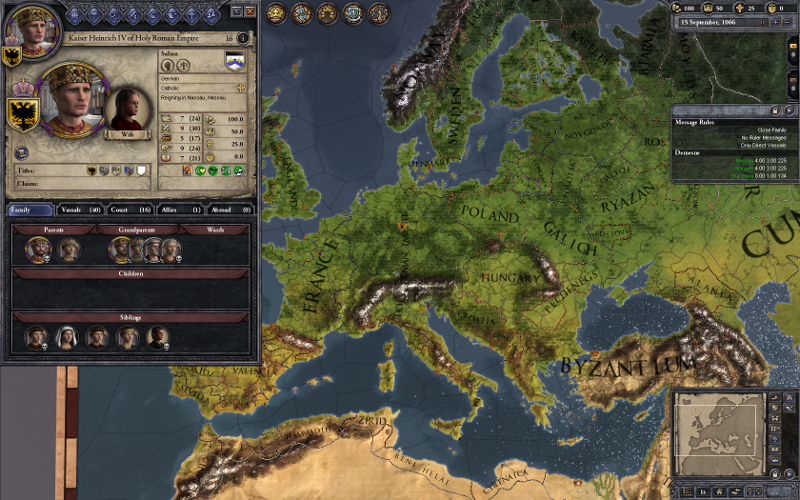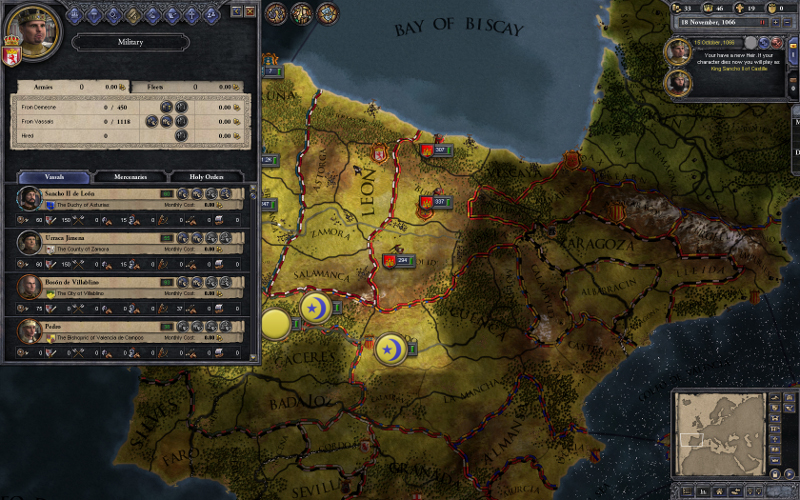Search
[{{{type}}}] {{{reason}}}
{{/data.error.root_cause}}{{{_source.title}}} {{#_source.showPrice}} {{{_source.displayPrice}}} {{/_source.showPrice}}
{{#_source.showLink}} {{/_source.showLink}} {{#_source.showDate}}{{{_source.displayDate}}}
{{/_source.showDate}}{{{_source.description}}}
{{#_source.additionalInfo}}{{#_source.additionalFields}} {{#title}} {{{label}}}: {{{title}}} {{/title}} {{/_source.additionalFields}}
{{/_source.additionalInfo}}- Details
- Category: Computer
- By ChickenSoup
- Hits: 15262
Crusader Kings II

Crusader Kings II
Developed By: Paradox Interactive
Published By: Paradox Interactive
Released: February 14, 2012
Available On: PC
Genre: Grand Strategy
ESRB Rating: T for Teen: Blood, Language, Violence
Modes: Single and Multiplayer
Price: $39.95
Thank you GamersGate for sending us this game to review!
You've heard the story a thousand times. You, the fearless leader of the country of your choice, are given control of your medieval fiefdom of choice, and it is up to you to unite Europe under your rule. However, Crusader Kings II is an entirely different beast than such well-known titles as Medieval II: Total War. This game encompasses a period of time which is perhaps most known for its conflict, division, and violence, yet it actually removes much of the military focus. Instead of constructing enormous armies and training specific units to conquer your neighbors, your time will be focused much more on carefully balancing a delicate web of interpersonal and inter-familial relationships.
It is extremely important to approach this game differently than you would a Total War game. I mention this because I began playing with an attitude entirely inappropriate for this game. When playing any game in a medieval setting, it has become my custom to think primarily short-sightedly. Sure, I had long-term goals, but they managed to take care of themselves as most of the steps on the way there primarily involved taking and holding territories. If I were tempted to blitzkrieg a neighbor from three different sides, it was entirely within my power to do as I pleased, provided I could handle the counter-offenses. Even in turn-based strategy, my focus has always been on getting the best troops and the best land in the game.
Where Crusader Kings II stands out from other games that I have played is that diplomacy, intrigue, and one's standing with others supplants military might as the player's chief concern. See, it isn't even enough to be held in high regard by neighboring nations. No, the player has underlings to deal with as well; these vary from earls to family members to whomever may be higher on the totem pole. You may choose to play as the king of the Holy Roman Empire and need to please the many earls and landholders under you. Then again, you might choose to play as one of those lesser landholders, needing to please both the king and those under your rule. Meanwhile, the pope will be keeping his eye on the piety of your every action.

Strong Points: Unique style of grand strategy gameplay that focuses on interpersonal relationships and diplomacy rather than just war.
Weak Points: Difficult to manage, numerous but largely unhelpful tutorials.
Moral Warnings: Not many, unless you have a problem with arranging marriages.
How might one deal with such complexity? Simple, dear reader: pause and fast forward buttons. No, seriously. You'll need to do a lot of planning to accomplish your goals; as such, you will need to take a step back and take a look at the big picture. After you've done some things—arranged a marriage here, fabricated some land claims there—you'll likely adjust the variable game speed buttons to bump the game forward a couple years to see your plans unfold. Obviously, you'll need ample patience.
The learning curve in this game is really quite steep, and the tutorials are a sad cluster of quick and dirty playthroughs that will only roughly equip you with taking on medieval Europe. It is worth noting that I had to skip a step in the military tutorial due to confusing directions: in this case, the game instructed me to merge my two armies into a single, two-winged division. You might imagine my frustration and dismay when I saw that the required button was grayed out and the action was unable to be completed. If you can push through the initial confusion, though, and learn to deal with the sheer scope of diplomacy that will be required of you, you will be quite satisfied in the end.
As I mentioned before, the gameplay is initially confusing but, given patience, eventually rewarding. Battles take place in the form of a single man on the map representing each army (a la Total War), but there is no real-time strategy component. Instead, a battle is simulated through a few turn-based screens in which you field, one at a time, the divisions of your army. War is a particularly tricky thing to begin at all, really, for you must have a “casus belli”--in short, a reason to fight. After my initial playthrough of the tutorial, I promptly forgot how to start a war and was quickly filled with frustration—however, this isn't a “pick up and play” kind of game anyway. I was disappointed, though, at the daunting feeling that can fill you as you try to just manage everything. The best summary of this that I can find is by CCG member Wilpanzer: “I really liked all the ideas, but as you get into the game things start falling apart. [...] Good ideas, bad implementation.”

Higher is better
(10/10 is perfect)
Game Score - 82%
Gameplay - 16/20
Graphics - 8/10
Sound - 9/10
Stability - 5/5
Controls - 3/5
Morality Score - 88%
Violence - 7/10
Language - 7/10
Sexual Content - 10/10
Occult/Supernatural - 10/10
Cultural/Moral/Ethical - 10/10
Graphically, CKII is nothing special. It isn't bad, though; it just isn't eye candy. The sound is actually quite good, and the soundtrack is quite fitting and enjoyable. Occasionally, though, I would turn off the music for want of peace; after a while it can grow tiring to hear epic, bombastic orchestras pounding in one's ears. The game never crashed while I played it, and I didn't experience any bugs.
Violence, though prevalent through the game, is reduced to a couple guys swinging swords at each other due to the nature of how battles are handled. The language in this game isn't noteworthy: there were incidences of minor cursing, and there are titles in names containing the word “b*****d.” Sexuality in the game seems to be limited to the attributes the characters have, and these affect the character's fertility and likelihood of having children. Examples of such attributes are homosexuality, repression, and chastity, each tagged with a short description of how the trait affects the character. For example, "celibate" implies that producing children will be problematic for the character, "inbred" implies relations between family, "homosexuality" will remove all interest in the opposite sex (as well as affecting other's opinions of the character), and "hedonist" implies a commitment to a life of sin, considerably increasing the character's fertility.
Overall, I really wanted to enjoy Crusader Kings II. It certainly accomplishes what it sets out to do, for the most part anyway. And maybe this game just wasn't suited to my tastes. If what you're seeking is a relatively clean grand strategy game that focuses on intrigue and diplomacy, this is your game. For that, I acknowledge Paradox's accomplishment of developing a new breed of grand strategy game. However you spin its uniqueness, though, you can't hide the fact that CKII is fairly unimpressive overall. I spent so much time pausing and rethinking my plans that I never experienced the most important aspect of all: fun.






